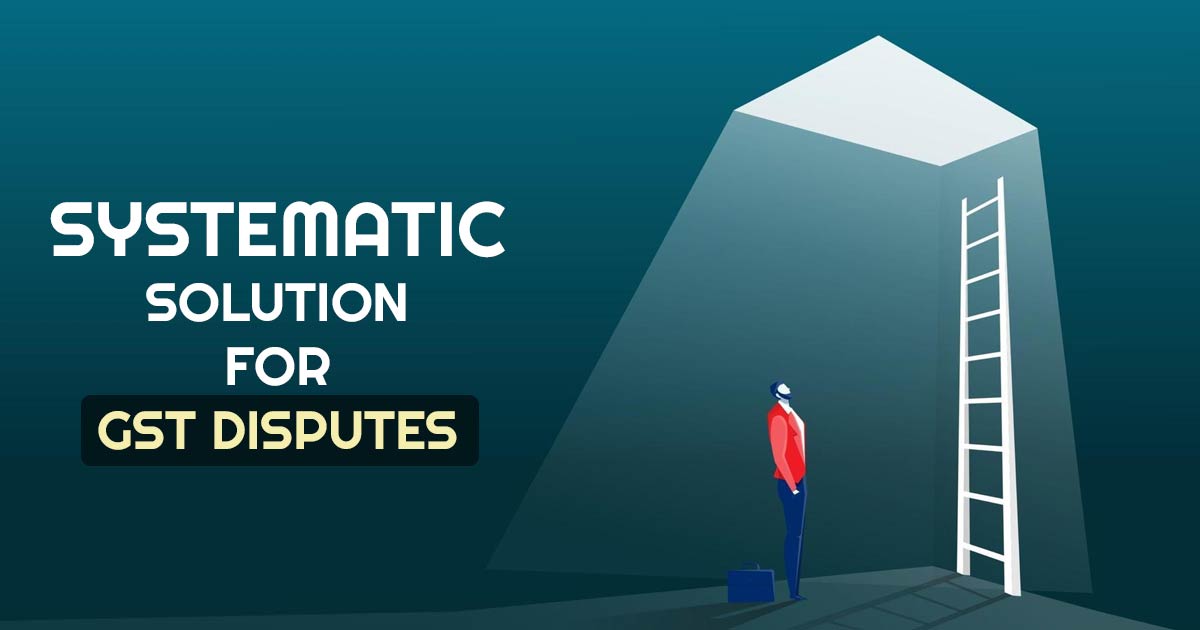
A unified national market for goods and services was intended to be created by the Goods and Services Tax (GST), which was established with the claimed goal of rationalizing India’s indirect tax environment. The three pillars of this “one nation-one tax” strategy were ‘ease of doing business’, economic expansion and pricing rationalization. A strong dispute resolution system that prioritizes efficiency in the resolution of disputes while minimizing litigation costs is essential to the success and efficacy of tax changes.
Differences between the tax paid by the assessees and how the authorities compute the tax due give rise to issues under the GST. Such tax disagreements may come up as a result of a number of factors during the assessment, audit, and/or scrutiny of records and accounts, including the tax rate, a tax exemption claim, an input tax credit claim, an incorrectly determined place of supply, the type of supply (composite or mixed supply), the classification of goods and services, etc. Early results contradict claims that GST will reduce the number of tax disputes and streamline tax administration.
Authorities and taxpayers continue to take opposing positions; the outline of lawsuits reveals that the main point of contention points to historical patterns. Litigation has increased as a result of disagreements over legal interpretation, an insufficient system for advanced rulings, and tax authorities’ emphasis on income. In order to stop the tendency, it is therefore imperative that an appropriate framework, including required governmental measures, is put into place. Some of these actions are listed below.
GST Amnesty Scheme for Inadvertent Errors
A one-time GST Amnesty program is urgently needed to help legitimate taxpayers who may have made mistakes unintentionally during the GST’s early stages. One of the biggest tax measures, the GST, has its own gestational problems.
As internal systems were being aligned and employees were being trained, there were many unintentional slipups in the early years as taxpayers and authorities attempted to understand the intricacy of the legislation. These are currently the subject of departmental audits and scrutiny, which has resulted in a rush of tax requests, interest charges, and fines.
It appears that the government is thinking of implementing a GST dispute resolution program to provide firms with a one-time chance to resolve tax disputes. It is understood that the planned plan would not apply to willful tax evasion or offenders under investigation by the enforcement agencies.
The suggested plan is anticipated to be similar to the Union Government’s “Sabka Vishwas Scheme” of 2019, which aimed to settle all outstanding legal issues with the former Central excise and service tax.
GSTAT Setup
The Goods and Service Tax Appellate Tribunal (GSTAT) still hasn’t been established after five years of the GST. Without GSTAT, taxpayers are forced to go before High Courts, which puts additional strain on an already overworked legal system and delays the delivery of justice to legitimate taxpayers.
Even in cases when tax positions are wholly valid, the taxpayer is left with little choice but to wait for a solution. Furthermore, the Tribunal’s lack of constitutionality is increasing the cost of interest, delaying legitimate refunds, causing cash flow problems by pre-depositing taxes, and repeatedly serving show-cause notices that result in cascading conflicts. The GSTAT needs to be created right away, and conflicts must be resolved quickly.
Central GST AAR
To reduce litigation, the Authority of Advance Ruling (AAR) was established to offer clarity on tax positions in advance. Under their respective State GST Acts, AAR and the Appellate Authority of Advance Ruling (AAAR) were established.
As a result, authorities in other States could not recognise the decision made by the AAR or AAAR. Furthermore, the AAR lacks the authority to address every part of the GST law, including questions about the “place of supply,” which has long been a source of controversy.
Only the applicant who requested the advance ruling and the relevant/jurisdictional official in respect of the applicant shall be bound by AAR or AAAR. But inconsistent decisions in several jurisdictions regarding the same issues have spurred litigation. A central authority for AAR should be established by the government and the GST Council so that it can address concerns about “Place of Supply” and settle disagreements among State level AARs.
In addition, even in cases when a fair interpretation is obvious, the judgment has gone against the taxpayer because of the AAR’s revenue-centric strategy, which has damaged taxpayer confidence. It’s time to regain trust in AAR in order to forward the goals and objectives of this forward-thinking action.
The Alternative Dispute Resolution (ADR) process is a way for taxpayers and the government to settle disagreements outside of court. Advance Rulings are a type of ADR, but if the limitations of AARs noted above are solved, they might significantly lessen needless litigation.
Similar to this, the establishment of the Settlement Commission with the aim of accelerating the recovery of unpaid taxes gives the delinquents the opportunity to come clean as a one-time alternative to significantly cut down on the time and expense associated with fruitless litigation. As a means of resolving disputes, arbitration and mediation are also options that might be investigated.